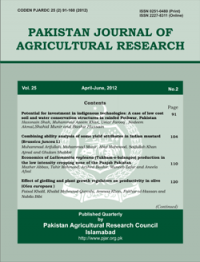RAISED BED TECHNOLOGY FOR WHEAT CROP IN IRRIGATED AREAS OF PUNJAB, PAKISTAN
Sajida Taj*, Akhter Ali*, Nadeem Akmal*, Shujaat Yaqoob** and Mubarik Ali***
ABSTRACT
The present paper analyzes the determinants of adoption of raised bed planting of wheat in irrigated areas of Punjab, Pakistan. Wheat is an important staple food of Pakistan. It contributes 13 % to the value added in agriculture and 2.6 % to the GDP. The agrarian economy of Pakistan is continuously under stress due to the low yield of almost all the crops and constrained with many problem. One of the most important issues of agriculture is water shortage which is increasing day by day and is a major challenge now a days. Therefore, water saving becomes the utmost need of the hour. The national research system is now putting their focus and efforts to manage the precious water through various modern/latest water saving models to draw some solid method of irrigation with less wastage. Raised bed planting method is also one of the modern methods of planting crop with significant water saving. The study was planned and conducted by the Social Sciences Research Institute, Faisalabad in 2011-12 to assess the determinants of the adoption of the raised bed technology for wheat crop in irrigated Punjab, Pakistan. The study was conducted at three sites of the districts Faisalabad and Toba Tek Singh where the Water Management Research Institute, University of Faisalabad promoted the raised bed technology for wheat crop. A sample of 63 farmers was interviewed in detail to understand the whole system and the factors contributing to the adoption of the technology. The study revealed that adopters typically have a more favorable resource base and tend to variously outperform non-adopters. More access to education and other social indicators increases the chances to adopt new technologies by the farming community. However, the small farmers can also be benefited with the technology with proper education regarding the technology in the area with good social mobilization for the conservation of scarce and valuable farm resources.
To share on other social networks, click on any share button. What are these?






